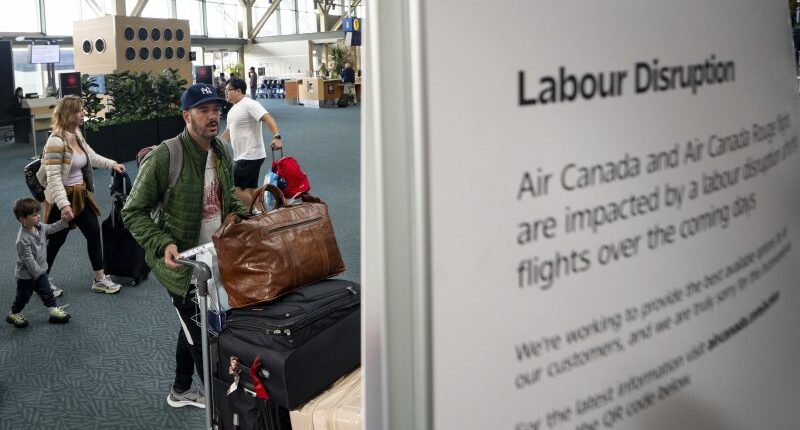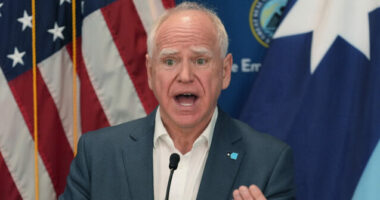Share this @internewscast.com
TORONTO (AP) — Air Canada announced it has paused its plans to recommence operations on Sunday following an announcement from the union representing 10,000 flight attendants, stating they will ignore the order to return to work. The strike has been impacting about 130,000 travelers worldwide each day during the busy summer travel period.
The Canadian Industrial Relations Board had mandated that airline staff return to their duties by 2 p.m. on Sunday after government intervention. Air Canada initially expected to resume flight services Sunday evening.
The airline, Canada’s largest, has now decided to recommence flights Monday evening. Air Canada declared in a statement that the union “unlawfully instructed its flight attendant members to disregard a directive from the Canadian Industrial Relations Board.”

“Our members will not return to work,” stated Mark Hancock, the national president of the Canadian Union of Public Employees, outside Toronto’s Pearson International Airport. “We are firmly against this.”
The federal government didn’t immediately provide comment on the union refusing to return to work.
Hancock said the “whole process has been unfair” and said the union will challenge what it called an unconstitutional order.
“Air Canada has consistently refused to negotiate with us, relying on the expectation that the government would intervene to resolve the situation,” Hancock added.
Earlier on Sunday, Canada’s leading airline indicated in a release that initial flights were planned to resume later in the day, though it would take several days for operations to return to normal. They mentioned that some flights would face cancellations over the next week to 10 days while schedules are adjusted.
Less than 12 hours after workers walked off the job, Federal Jobs Minister Patty Hajdu ordered the 10,000 flight attendants back to work, saying now is not the time to take risks with the economy and noting the unprecedented tariffs the U.S. has imposed on Canada. Hajdu referred the work stoppage to the Canada Industrial Relations Board.
The airline said the CIRB has extended the term of the existing collective agreement until a new one is determined by the arbitrator.
The shutdown of Canada’s largest airline early Saturday was impacting about 130,000 people a day. Air Canada operates around 700 flights per day.
Flight attendants walked off the job around 1 a.m. EDT on Saturday. Around the same time, Air Canada said it would begin locking flight attendants out of airports.
The bitter contract fight escalated Friday as the union turned down Air Canada’s prior request to enter into government-directed arbitration, which allows a third-party mediator to decide the terms of a new contract.
Last year, the government forced the country’s two major railroads into arbitration with their labor union during a work stoppage. The union for the rail workers is suing, arguing the government is removing a union’s leverage in negotiations.
The Business Council of Canada had urged the government to impose binding arbitration in this case, too. And the Canadian Chamber of Commerce welcomed the intervention.
Hajdu maintained that her Liberal government is not anti-union, saying it is clear the two sides are at an impasse.
Passengers whose flights are impacted will be eligible to request a full refund on the airline’s website or mobile app, according to Air Canada.
The airline said it would also offer alternative travel options through other Canadian and foreign airlines when possible. Still, it warned that it could not guarantee immediate rebooking because flights on other airlines are already full “due to the summer travel peak.”
Air Canada and CUPE have been in contract talks for about eight months, but they have yet to reach a tentative deal. Both sides have said they remain far apart on the issue of pay and the unpaid work flight attendants do when planes aren’t in the air.
The airline’s latest offer included a 38% increase in total compensation, including benefits and pensions, over four years, that it said “would have made our flight attendants the best compensated in Canada.”
But the union pushed back, saying the proposed 8% raise in the first year didn’t go far enough because of inflation.
















